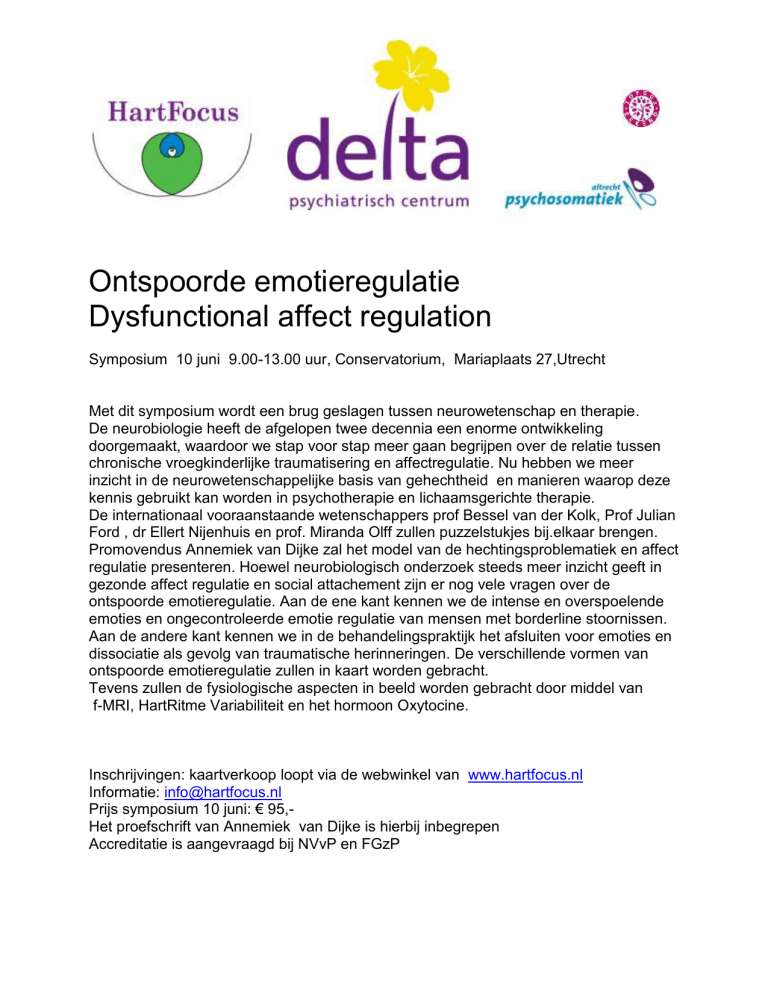
Ontspoorde emotieregulatie
Dysfunctional affect regulation
Symposium 10 juni 9.00-13.00 uur, Conservatorium, Mariaplaats 27,Utrecht
Met dit symposium wordt een brug geslagen tussen neurowetenschap en therapie.
De neurobiologie heeft de afgelopen twee decennia een enorme ontwikkeling
doorgemaakt, waardoor we stap voor stap meer gaan begrijpen over de relatie tussen
chronische vroegkinderlijke traumatisering en affectregulatie. Nu hebben we meer
inzicht in de neurowetenschappelijke basis van gehechtheid en manieren waarop deze
kennis gebruikt kan worden in psychotherapie en lichaamsgerichte therapie.
De internationaal vooraanstaande wetenschappers prof Bessel van der Kolk, Prof Julian
Ford , dr Ellert Nijenhuis en prof. Miranda Olff zullen puzzelstukjes bij.elkaar brengen.
Promovendus Annemiek van Dijke zal het model van de hechtingsproblematiek en affect
regulatie presenteren. Hoewel neurobiologisch onderzoek steeds meer inzicht geeft in
gezonde affect regulatie en social attachement zijn er nog vele vragen over de
ontspoorde emotieregulatie. Aan de ene kant kennen we de intense en overspoelende
emoties en ongecontroleerde emotie regulatie van mensen met borderline stoornissen.
Aan de andere kant kennen we in de behandelingspraktijk het afsluiten voor emoties en
dissociatie als gevolg van traumatische herinneringen. De verschillende vormen van
ontspoorde emotieregulatie zullen in kaart worden gebracht.
Tevens zullen de fysiologische aspecten in beeld worden gebracht door middel van
f-MRI, HartRitme Variabiliteit en het hormoon Oxytocine.
Inschrijvingen: kaartverkoop loopt via de webwinkel van www.hartfocus.nl
Informatie: [email protected]
Prijs symposium 10 juni: € 95,Het proefschrift van Annemiek van Dijke is hierbij inbegrepen
Accreditatie is aangevraagd bij NVvP en FGzP
Programma vrijdag 10 juni: Ontspoorde Emotieregulatie
9.00 ontvangst
9.15 opening door dagvoorzitter Onno van der Hart, PhD,hoogleraar psychopathologie
van chronische traumatisering, Klinische en gezondheidspsychologie
Universiteit Utrecht
9.20 :Annemiek van Dijke, MSc, klinisch neuropsycholoog, Delta Psychiatrisch
Centrum: De cirkel van disfunctionele affect regulatie.
Over deactivering en hyperactivering van het systeem van emotieregulatie,
op zowel de cognitieve, affectieve , somatische als interactieve aspecten
9.35: Ellert Nijenhuis. PhD, psychotherapeut en onderzoeker aan het Top Referent
Trauma Centrum GGZ Drenthe,
Dissociatie van de persoonlijkheid in trauma: biopsychosociale pro’s en
contras. In de theorie van dissociatie van de persoonlijkheid wordt het
overlevingsdeel (ANP) en het emotionele deel (EP) gesplitst. Experimentele
studies in het neuro-imaging lab leveren nieuwe inzichten op. Zijn EP en ANP
zichtbaar als biopsychosociale functies? Wat gebeurt er met EP en ANP als
de mentale vermijding doorgaat? Kan dissociatie ook fantasie of spel zijn?
10.10: Bessel van der Kolk, PhD, hoogleraar psychiatrie Boston University
Innovaties in het behandelen van complexe PTSD
zoals sensorimotor therapy, neurofeedback en yoga.
Vroegkinderlijke traumatisering en extreme stress (DESNOS) leiden tot
symptomen zoals dysfunctionele affectregulatie. Kunnen we door
neurobiologische inzichten integratieve behandelmethoden waarbij
lichaamsgerichte, psychodynamische en interpersoonlijke aspecten
worden geïntegreerd innovaties bewerkstelligen?
11.00: pauze
11.20: Kees Blase,MSc, medisch fysicus en andragoloog, Landelijk Centrum
Stressmanagement: HartRitmeVariabiliteit als marker van de modus van
het autonome zenuwstelsel: Wat is neuroceptie? Kan de patiënt zelf het
autonome zenuwstelsel beïnvloeden met HRV?. Wat kunnen we in
een therapeutische sessie zien met HRV als marker?
11.40: Miranda Olff,PhD hoogleraar psychotraumatologie, Academisch Medisch Centum,
Universiteit van Amsterdam: Oxytocine, sociale steun en PTSD.
Wat doet het oxytocine systeem in relatie tot sociale steun en PTSD?
Wat zijn de consequenties voor traumabehandeling en preventie?
12.00: Julian D. Ford PhD, hoogleraar psychiatrie University Connecticut Medical
School : Making Emotion Regulation Transparant:
A Neurocognitive Paradigm for Complex Trauma Psychotherapy.
Wat is het verschil tussen “emotion processing” en emotion regulation”?
En hoe speelt zelfreflectief bewustzijn van mentale activiteiten een rol in
emotieregulatie? Toegespitst op kinderen en jeugdigen.
12.45: prof Onno van der Hart verbindt in zijn afsluitende woorden de presentaties van
de diverse sprekers
12.55: muzikale affectieve afsluiting
13.00: einde.
‘s middags: promotie Annemiek van Dijke in Academiegebouw Universiteit Utrecht
Bessel van der Kolk MD heeft als psychiater de afgelopen 30 jaar de impact en
behandelingsmogelijkheden van trauma bestudeerd bij kinderen en volwassenen.
Hij is hoogleraar psychiatrie aan de Boston University Medical School en
Medisch Directeur van het Trauma Centre of JRI in Brookline Massachusets. Hij
is president geweest van de International Society for Traumatic Stress Studies.
Zijn werk integreert de neurobiologische, psychodynamische en interpersoonlijke
aspecten van de impact van trauma en de behandeling daarvan. Het spectrum
reikte van onderzoek naar de impact van trauma en neuro-imaging tot
behandelmethoden als neurofeedback, EMDR, en theatergroepen met PTSS. Als
een van de eersten hield hij een pleidooi voor het introduceren van de
diagnostische categorie complexe PTSS, waarmee recht gedaan wordt aan de
gevolgen van vroegkinderlijke traumatisering, die mede tot uiting komen in
symptomen die niet beschreven worden in PTSS volgens DSM IV.
Julian D.Ford PhD is hoogleraar psychiatrie aan de University Connecticut
Medical School en directeur het het UCHC Center for Child Trauma Treatment.
President van de International Society for Traumatic Stress Studies. Hij
ontwikkelde het TARGET behandelingsmodel PTSD voor volwassenen,
adolescenten en kinderen. Hij is co-auteur van drie recente boeken Treating
Traumatized Children (2008), Treatment of complex traumatic stress disorders
(2009) en Encyplopedia of Psychological Trauma (2008).
Bessel vdKolk Ellert Nijenhuis Julian D.Ford Miranda Olff Onno vd Hart AnnemiekvDijke Kees Blase
Onno van der Hart, PhD is a psychologist, adult psychotherapist, trained family
therapist and researcher, he is Honorary Professor of Psychopathology of Chronic
Traumatization at the Department of Clinical and Health Psychology at University of
Utrecht. Psychotherapist at the Sinai Center for Mental Health, Amstelveen. Evenals
Ellert Nijenhuis is hij co-auteur van het boek Het belaagde zelf: Structurele dissociatie
en de behandeling van chronische traumatisering (2010)
Annemiek van Dijke, MSc, Head of research department Landelijk Centrum
Vroegkinderlijke chronische Traumatisering. Clinical psychologist, neuropsychologist .
and educator at Delta Psychiatrisch Centrum. Juni 10 she will defend her thesis
Dysfunctional Affect Regulation in borderline personality disorder(BPD) and somatoform
disorder (SoD).
Ellert Nijenhuis, Ph.D., is psychologist, psychotherapist, and researcher at the Top
Referent Trauma Center of GGZ Drenthe, Assen, and co-director of
Psychotraumatology Institute Europe, Duisburg. In 1998 the International Society for the
study of Trauma and Dissociations granted him the Morton Prince Award for scientific
excellence. In 2000, 2002 and 2005 he received rewards for outstanding contributions to
the diagnosis, treatment, research and education in dissociative disorders.
According to the theory of dissociation of personality, dissociation in trauma
involves an integrative deficit. However, given this deficit, it also serves as a defense in
some regards. In its simplest form, this dissociation is between one ty In 1998pe of
subsystem of personality as a whole biopsychosocial system that is focused on
functioning in daily life despite ongoing or past traumatization, and another type of
subsystem fixated on defense in the face of this traumatization. While the first type,
described as an apparently normal part of the survivor's personality (ANP), may more or
less protected from experiencing, knowing, and realizing the traumatization, a different
type, known as an emotional part of the personality (EP), is fixated on this
traumatization, and suffers. These hypotheses have been examined in several
experimental neuro-imaging studies. Do these different parts have their own theoretically
predicted biopsychosocial features? How the survivor as ANP mentally avoid
experiencing, knowing, and realizing the traumatization? What happens to EP when
ANP's mental avoidance continues? Or is, as some critical voices assert, dissociation of
personality fake, that is, a matter of fantasy, suggestion, and role playing?
Kees L Blase, Medical Physics,MSc Neurobiology BSc and Adult Education MSc is
director research at the National Centre Stressmanagement . He introduced HRVbiofeedback in 2000 in the Netherlands in education, health and governmental
organisations. He is educator HRV-biofeedback at the Police Trainingscentre
Amsterdam to prevent PTSD in police.
Miranda Olff, PhD Professor Psychotraumatologie, Academic Medical Center,
University of Amsterdam; President of the European Society for traumatic stress studies;
editor-in-chief of European Journal of Psychotraumatology.
She is expert on Oxytocin, social support and PTSD.
What does the oxytocine system do? How is it related to social support and PTSD?
What are the consequences for prevention and treatment?
Julian D Ford
Making Emotion Regulation Transparant: A Neurocognitive Paradigm for complex
Trauma Psychotherapy.
Emotion regulation is well established scientifically and clinically as a fundamental
impairment for individuals with complex traumatic stress disorders and the dissociative
subtype of PTSD. Despite important advances in the development of effective
psychotherapies for PTSD ans post-traumatic dissociative disorders, there is a need to
make “emotion processing” and “emotion regulation” transparent and behaviourally
specific for clients. A neurocognitive model of psychotherapy that enables complex
trauma survivors to not just manage emotional distress but to use mentalization to
understand and modify their emotion regulation strategies, will be described.
What is the difference between “emotion processing” or “managing emotional distress”
versus “emotion regulation” and how is mentalizing (self-reflective awareness of ones
own mental activities) involved in emotion regulation?
What are the neurocognitive components of mentalizing-based emotion regulation, and
how can these be made transparent and practical in psychotherapy for complex trauma
survivors?











